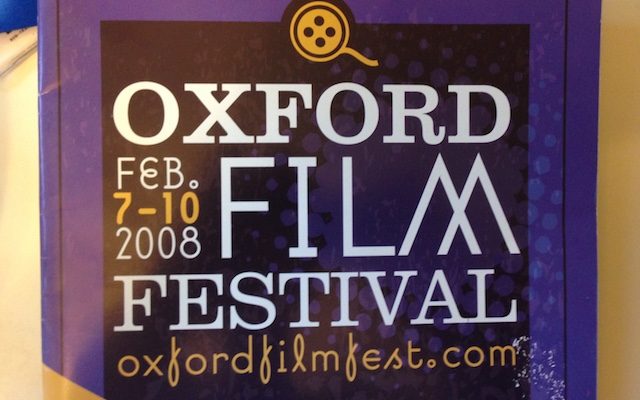
Sure, the Sundance Film Festival boasts swanky premieres and tons of celebrities, and the Cannes Film Festival is where the elite of the film world gather to hobnob and make deals. But only at the Oxford Film Festival in Oxford, Mississippi, would the opening-night party be held in a private home where over the kitchen sink hangs a small painting of slaves picking cotton.
They are not entirely at peace with the less savory aspects of their heritage here in Oxford, though that’s not to say they’re exactly at war with them, either. Things just sort of … are. The University of Mississippi campus — that’s Ole Miss to you college sports fans — has a road called Confederate Drive, and a riot ensued when the first black student tried to enroll there in 1962. But then again, the city (population 17,000, with Ole Miss students doubling it) was home to William Faulkner and is also home to this film festival, which celebrates independent movies and forward-thinking artistic expression.
I had never been to Mississippi before, of course, because why would you go to Mississippi? And most of what I knew about the state wasn’t positive: high obesity rates, low student test scores, home of John Grisham, awfully close to Alabama. But my friend Scott Weinberg had been asked to be a panelist and juror for the film festival, and then he had a major dental emergency that prevented his attendance, and so when he asked if I’d like to go in his place, I only had one question: Is someone else paying for it?
Turns out someone else was, and so I was on my way. I boarded the plane 18 hours after Weinberg’s phone call. It was an impulse trip. An impulse trip to Mississippi.
* * *
At Memphis International Airport early Thursday afternoon I was met by two friends and fellow panelists, Cinematical’s Kim Voynar and Rotten Tomatoes’ Jen Yamato. Kim had rented a car for the three of us to travel in, and we were all staying at the same hotel in Oxford. I had a joyful reunion with them, little realizing that traveling with two women meant I would spend the bulk of the next three days standing around waiting for them.
We navigated our way to Oxford (70 miles from Memphis) and to the Holiday Inn Express, where the festival people had gift bags waiting for us. These folks went all out! A festival T-shirt, coffee mug, beer cozy (well, I guess it would work for any canned beverage, but you only ever see people using them with beer), a big chocolate chip cookie from a local bakery, bags of locally made potato chips, and copies of a magazine called Y’all (“The Magazine of Southern People”), which sounds like something I would make up but which actually exists. In this magazine was an old article by Lewis Grizzard explaining that while from one point of the view the Civil War was about Southerners trying to keep slavery, from another point of view it was about a group of Americans rising up together when they felt the federal government had gone astray and was treating them unjustly. It was about people having the courage to FIGHT for something, a principle that surely everyone can support.
In other words, they’re still really obsessed with the Civil War down here. I mean REALLY obsessed. You know how there’s that guy who was an all-star football player in high school and now he’s in his 30s and works in an office but he still talks about his football days all the time because it’s the only noteworthy thing he’s ever done? That’s the South and the Civil War.
Kim and Jen needed to go to Wal-Mart for a couple things, and both of them seemed fascinated by the whole idea of going to Wal-Mart, like they don’t have them where they live. I opted to stay at the hotel, knowing that shopping for “a couple things” with two women would take at least an hour. Plus, I thought going to Wal-Mart in Mississippi would be like going to a sauna in hell: a concentrated version of the environment I was already in. I didn’t have the strength this early in the trip. Wal-Mart would probably be much more tolerable if I’d quit being such a snob, but honestly, it’s easier to just not go to Wal-Mart.
The girls did their shopping and returned in time (barely) for us to get to the festival’s opening night merriment. The screenings were being held at a movie theater across the street from the entrance to Ole Miss, in what used to be a mall but which is now just a movie theater and a JCPenney’s (but which still says “Oxford Mall” at the entrance). Michelle and Melanie, two of the tireless festival organizers, both grad-school-age gals, met us at the theater and introduced us around. We were immediately struck by the friendliness and energy of the festival, smaller in size than its more notable counterparts but no less efficient and well run. And our fears that such a small fest in a small town in a state more known for hog-calling contests than cultural awareness might not be well attended proved groundless: The theater was packed.
The movie was a comedy called “Kabluey,” about a directionless 32-year-old man who moves in with his sister-in-law to help take care of his bratty nephews when his brother goes to Iraq. But before it started, we had a surprise guest to kick off the festival: Morgan Freeman.
Morgan Freeman is a Mississippi native and still has a house not too far from Oxford. Michelle told us they’d been trying to get him to come to the festival every year since it started, and while he’d always been willing, his busy film schedule had always prevented him. This time, Freeman’s people were still non-committal in December, when the printed program had to go to press, so they scrapped whatever big Freeman-related plans they had. Then Freeman’s people called today, 10 hours before opening night, and said, “Morgan is planning to come to the festival, and he wanted to know what you had for him to do.” The answer was, um, nothing, because we didn’t know he was coming, and what, it would kill you to try to plan something two months in advance?, but that kind of snag is a minor setback for resourceful people like Michelle. She opted to have him just say a few words about Mississippi and independent film and “welcome to the Oxford Film Festival” and stuff like that. It went over like gangbusters, of course, because it was Morgan Freeman, and the crowd was delighted to be in the same theater with him, even if he did just star in “The Bucket List.” He said his thing and left, having been in the room for all of five minutes.
After the film were more screenings of other things, but we had other priorities: the Oxford parties. Here’s how most film festivals do parties. Sundance has a few officially sponsored galas, but they are invariably lame and never attended by famous people (or if celebs do attend, they go to a special VIP section and don’t mingle with commoners). South By Southwest has great parties, and filmmakers do revel with the ordinary folk, but there typically isn’t much food or drink, and whatever there is goes pretty fast.
Now here’s how Oxford does it: Two parties a night, one starting at 9:30 and another at midnight. Abundant food and drink at both parties. Everyone with a festival pass is invited, meaning filmmakers, panelists, and film-buff Ole Miss students and Oxonians (that’s what people from Oxford are called!) all hang out together. And since the fest is still relatively small, they can get away with having parties not in huge rented halls or restaurants, but in people’s houses, which are soon packed to the rafters with enthusiastic Southerners.

The first party was at the home of Donna Ruth, a rich, pixieish widow who contributes time and money to the festival. She was exactly what you’d expect from an old-school Southern woman in terms of hospitality and graciousness, but with the added twist of, well, supporting an independent film festival. Her home, built in the 1850s, was the most beautiful house I’d ever been inside of without police being summoned. The architecture was elegant, with high ceilings, large (but not overwhelming) rooms, and ornate moldings, and the home had been tastefully, exquisitely decorated. It was the kind of house that ought to have secret passageways and servants’ quarters. Every inch of the place smelled like flowers, too. Kim said they were hydrangeas, and then someone else said they were gardenias, and everyone talked like they knew exactly what they were talking about, like they were botanists or something, but the weird thing was that we couldn’t tell where the smell was coming from. We couldn’t find any actual live flowers anywhere. People were talking about it: “Do you smell that?” “It’s tulips!” “We don’t see any flowers anywhere!” “Neither do we!” “Where is the smell coming from?!” I drew the only natural conclusion, given the facts at hand, which was that Donna Ruth is a witch.
She is definitely a good witch, though, as vivacious and high-spirited as a woman half her age, the kind of lady you hesitate to call “old” (even if it’s technically true) because it doesn’t really fit. She’s active in every aspect of Oxford life, from Republican politics to the arts. She treated every guest as if she had invited each of us personally, when in fact we were just festival-goers and there were more than a hundred of us and we were stealing her knick-knacks.
Donna Ruth quickly became the sassy grandmother to the festival, the patron saint of Oxford. She’s not the cookie-bakin’ kind of grandma, either. She’s the drinkin’ kind. She always had a glass of something in her hand. Neither of my real grandmas baked cookies, but they didn’t drink, either. Then they died. I kind of got gypped in the grandma department. They weren’t even witches.
On the wall of Donna Ruth’s kitchen hung a large reproduction of what looked like an old magazine advertisement featuring a drawing of a black tuxedoed man holding a piping hot bowl and saying, “Puttin’ on the gritz!” Jen wanted my opinion on this (hers was manifest in her tone of voice), so I said, “Well, it’s not like there’s no such thing as a black waiter, and they do eat grits down here. He’s not drawn like a caricature or anything.”
Then she pointed to another picture, this time a drawing of some monkeys dressed as waiters. “They’re just monkeys!” I said. “If they had been drawn with the facial features of a particular race, then that would be something else.”
Then she pointed to another picture. I said, “Well, that’s a picture of slaves picking cotton.” I couldn’t really rationalize that one.

The food at this party was being prepared by an actual chef, a casual fellow named Grantley whose informal air belied his skill. He was set up on the back patio, aided by a partner, and they cooked everything on a big wok. There were shrimp, catfish, short ribs, a variety of delicious sauces and sides, and tasty? Hoo-wee! To use a Southern expression I once heard, it’ll make your tongue want to slap your head off. It was without question the best food I’d ever eaten at a film festival party. In fact, given my regular diet of frozen dinners and Pop-Tarts, it was some of the best food I’d ever eaten anywhere.
Kim and Jen and I mingled and met other festival-goers. We met a feisty old lady who wasn’t Donna Ruth but who was also a festival supporter. She told us her son had moved to Texas some time ago — I got the impression Mississippians view Texas the way the Western states view California: with disdain and mistrust — and he had sent her a pair of boots as a gift. They were roper’s boots, like those worn by female rodeo participants. Being a good mother, she figured she should wear them a few times, but it was difficult because, in her own words, “I don’t like shoes that take two hands to get on. But I discovered that if I wore panty hose, they’d slide on easier, and so that’s what I did. I know that’s not how those boots were meant to be worn, but it was the only way I could get them on!” She’d be a good surrogate grandma, too, if Donna Ruth is unable to fulfill her duties, like if she gets called away to be an adjunct professor at Hogwarts or something.
It got to be midnight, eventually, and we’d all made several new friends among the filmmakers and festival-goers. The after party was tempting, but the three of us had been traveling since very early that morning, and we were exhausted. So we headed back to our separate rooms at the Holiday Inn Express, thrilled that our first several hours in Mississippi had been a success, and that we had not had to witness any tar-and-featherings or moonshine-distillery explosions.
(Part 2)




